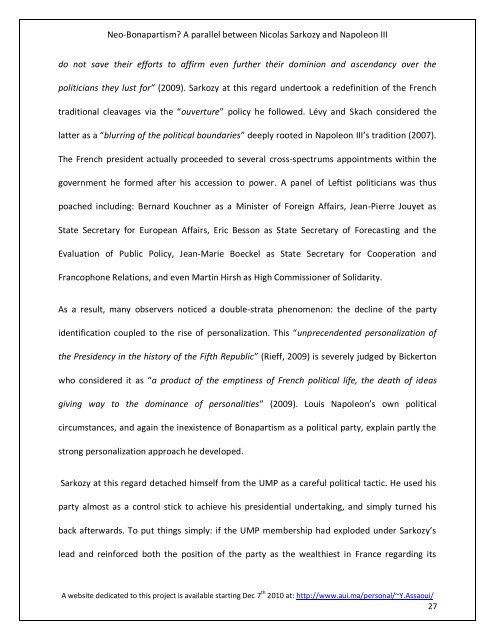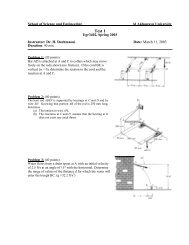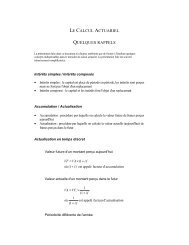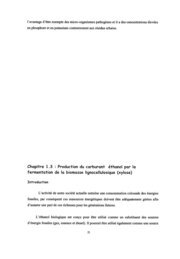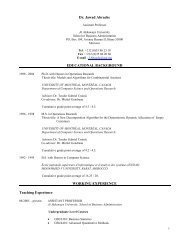Neo-Bonapartism? A parallel between Nicolas Sarkozy and ...
Neo-Bonapartism? A parallel between Nicolas Sarkozy and ...
Neo-Bonapartism? A parallel between Nicolas Sarkozy and ...
Create successful ePaper yourself
Turn your PDF publications into a flip-book with our unique Google optimized e-Paper software.
<strong>Neo</strong>-<strong>Bonapartism</strong>? A <strong>parallel</strong> <strong>between</strong> <strong>Nicolas</strong> <strong>Sarkozy</strong> <strong>and</strong> Napoleon III<br />
do not save their efforts to affirm even further their dominion <strong>and</strong> ascendancy over the<br />
politicians they lust for” (2009). <strong>Sarkozy</strong> at this regard undertook a redefinition of the French<br />
traditional cleavages via the “ouverture” policy he followed. Lévy <strong>and</strong> Skach considered the<br />
latter as a “blurring of the political boundaries” deeply rooted in Napoleon III’s tradition (2007).<br />
The French president actually proceeded to several cross-spectrums appointments within the<br />
government he formed after his accession to power. A panel of Leftist politicians was thus<br />
poached including: Bernard Kouchner as a Minister of Foreign Affairs, Jean-Pierre Jouyet as<br />
State Secretary for European Affairs, Eric Besson as State Secretary of Forecasting <strong>and</strong> the<br />
Evaluation of Public Policy, Jean-Marie Boeckel as State Secretary for Cooperation <strong>and</strong><br />
Francophone Relations, <strong>and</strong> even Martin Hirsh as High Commissioner of Solidarity.<br />
As a result, many observers noticed a double-strata phenomenon: the decline of the party<br />
identification coupled to the rise of personalization. This “unprecendented personalization of<br />
the Presidency in the history of the Fifth Republic” (Rieff, 2009) is severely judged by Bickerton<br />
who considered it as “a product of the emptiness of French political life, the death of ideas<br />
giving way to the dominance of personalities” (2009). Louis Napoleon’s own political<br />
circumstances, <strong>and</strong> again the inexistence of <strong>Bonapartism</strong> as a political party, explain partly the<br />
strong personalization approach he developed.<br />
<strong>Sarkozy</strong> at this regard detached himself from the UMP as a careful political tactic. He used his<br />
party almost as a control stick to achieve his presidential undertaking, <strong>and</strong> simply turned his<br />
back afterwards. To put things simply: if the UMP membership had exploded under <strong>Sarkozy</strong>’s<br />
lead <strong>and</strong> reinforced both the position of the party as the wealthiest in France regarding its<br />
A website dedicated to this project is available starting Dec 7 th 2010 at: http://www.aui.ma/personal/~Y.Assaoui/<br />
27


